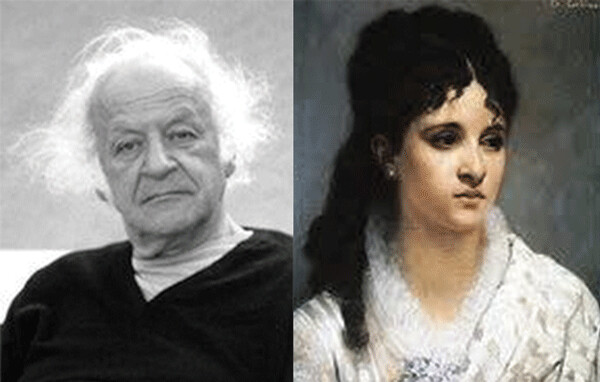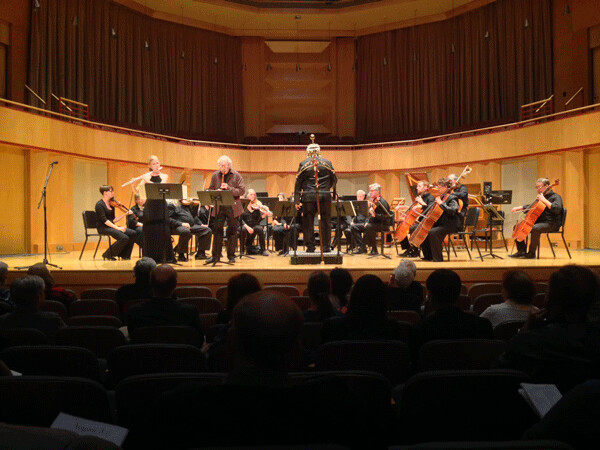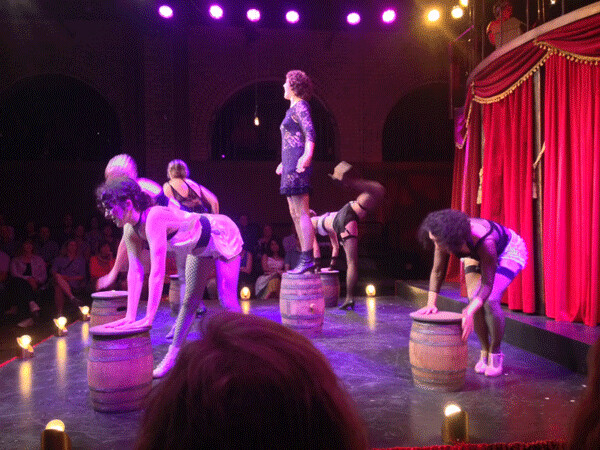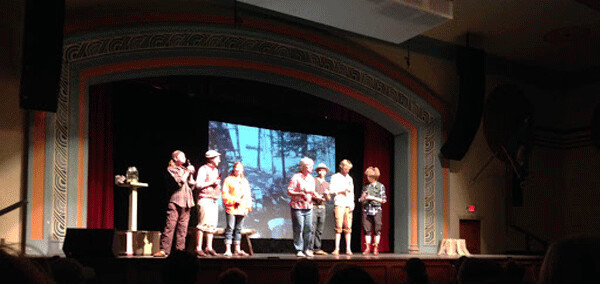Adventuresome, Transforming, and Always Musical

This summer marked the thirty-first consecutive season of concerts by the Lake Superior Chamber Orchestra, under the direction of Warren Friesen, who established this ensemble back in 1987. A major part of Friesen’s goal was to be able to offer music that had not been performed in Duluth before, including newly composed works each season. Frequently, his choices had not even been performed in the United States until his concerts took place. That was again the case this summer.
Friesen and the LSCO also perform music by Mozart, Copland, Beethoven, Bach, Tchaikovsky, Ravel — composers known to most classical music lovers. But as a performing musician, I am particularly drawn to music that I have never encountered before.

This year, the LSCO administrators chose to use soloists who were close at hand, Tom Pfotenhauer from UMD, Jeff Madison & Vicki Fingalson from UWS, Gaelynn Lea Tressler from Duluth and NPR acclaim, and Shelley Gruskin from CSS, with his flute-playing daughter Johanna, now based in Miami, FL. That, perhaps, made it possible to commission three completely new pieces of music this year. All three compositions were top-notch and deserve repetition in the coming years.
New York composer Wang Jie created a short opera based on an emotionally disappointing Mother’s Day for an inmate at the Shakopee Women’s Correctional Facility. Baritone Jeff Madison, a prison guard, interacted with Soprano Vicki Madison, an inmate whose daughter did not come to visit on this special Sunday, in this premier of It Rained on Shakopee, July 20, 2017.
Duluth songstress Gaelynn Lea won the 2016 Tiny Desk Contest, nationally sponsored by National Public Radio. Her love song, Someday We’ll Linger in the Sun topped 6,100 other entries last year. So Bradley Bombardier, well-known composer/arranger for the LSCO, worked with Gaelynn to take five of her songs, creating a suite called Body of Work. This premiered on July 27, 2017, with the LSCO singing along, and the lovely melodies of Gaelynn Lea filling the Weber Music Hall at UMD.
Most recently, on August 3, 2017, Friesen programmed four pieces new to Duluth, three of them United States premiers as well. The Swiss composer Rolf Liebermann is no stranger to opera enthusiasts, but his Suite on Swiss Folksongs (1947) had never been performed in the USA until last week. It’s six movements are all dance-like, with melodies that made me want to whistle along. We did not have the words in the program, but that’s probably a good thing. Images of beer steins and waltzing filled the air with clarinets and bassoons joining the strings to bring Switzerland a bit closer to Duluth.
French composer Melanie Bonis was somewhat popular in Paris during the first quarter of the 20th century, but virtually unknown today. Friesen obtained copies of Three Pieces (Sarabande, Pavane, Bouree) from Bonis’ family members for last week’s performance. These charming dances for brass, woodwinds and strings were a real treat. The Sarabande was as stately and full-sounding as might be expected. The Pavane had a lot of string pizzicato with the woodwinds providing a very sweet melody for the imaginary dancers. Finally, the oboe led the sprightly Bouree while all the other players imitated and chased each other around the dancing ring.
Duluth composer Mina Kaiser, connected to the LSCO for many years, wrote Tombeaux and Rainbow, a suite that treats both the despair and the hope that is so crucial to the lives of transgender individuals. The agitated first tombeau was followed by a series of trills and question marks in the second tombeau. Ultimately the rainbow - with its seven stripes - was celebrated rhythmically in seven ( 3 + 2 + 2) and offered a bubbly finale to the suite.
In and around these pieces Shelley Gruskin, recorder, and his daughter Johanna Gruskin, flute, offered a double concerto by Telemann, and Johanna closed out the evening with a performance of the Sonata Concertante, the last work written by the young Dutch composer Leo Smit, before he was murdered by the Nazis in 1943.
This has been a wonderful season for the LSCO, yet rather typical of its style summer after summer. I am always eager to see what new gems Warren Friesen will uncover or commission between now and July, 2018.

From Berlin, 1939, to the Isle of Pines at Knife Lake, 1930 - 1986
What a contrast my Saturday and Sunday entertainment provided this past weekend! We went home Saturday night after watching the emotional interactions between Sally and Cliff in the Cabaret life of Berlin, 1939. Then we drove up to Ely on Sunday afternoon to watch a musical exploration of the roller coaster life of Dorothy Molter, a real-life nurse and outdoor woman who welcomed visitors to the Isle of Pines for 50 plus years, creating a root beer in the 60s to help finance her modest lifestyle.
Entertaining and ignoring as a way of life
The stage play Cabaret was being produced at The Underground, which is a strong part of The Duluth Playhouse. Robert Lee was the director for this performance. In The Underground, the performance is always front and center, with the audience on three sides of the stage. Minimal set changes were required, so we easily moved back and forth between the Cabaret stage and the personal lives of Cliff, Sally, and their closest friends.
Shad Olsen had the role of Cliff Bradshaw, a fictional British author and interpreter who came to Berlin to learn more about what was going on. His part was rather understated all evening - compared to his recent performances in Billy Elliott and Le Cage aux Folles. He did create a Cliff who clearly understood the evil that was overtaking Germany, and even though he cared for Sally, he chose to leave while he was able.
Louisa Scorich as Sally Bowles is a different matter. Sally was not German, but she had captivated a certain night time audience at the risqué Kit Kat Club. She could sing and dance with an absorbed energy, and she was fearless, and probably in denial, regarding the increasing presence of the Nazi world around her. Scorich was a dynamo of her own Saturday night. The stage vibrated with her presence all evening, whether she was singing her torch songs or trying to persuade Cliff to be less serious.
Her powerful stage partner of the evening was Alec Schroeder as the chameleon master of ceremonies. Schroeder’s costumes and his conveying the nimble moods of his character were spectacular. From the opening moments of the show he directed the behavior of the audience very intentionally.
Thanks to Christine Winkler Johnson for preparing and leading the musical side of the show, and a special thank you to the unnamed choreographer who kept humor and sparkle in the many varied dance numbers.

Canoeing northeast of Ely during the middle of the 20th century
On a completely different planet, Barb Cary Hall has spent the last several years weaving the life of Dorothy Molter into a light musical. Her cast of a dozen or so local singers and musicians gave a fresh picture of the unique world of Molter, who jumped from a Chicago nursing school to an island about 35 miles northeast of Ely, MN, in 1930. She spent the next 56 years of her life on Isle of Pines, in the center of Knife Lake. The creation of the BWCA nearly forced her to abandon her home, but political efforts made it possible for her to remain on the island until her death.
Cary-Hall created songs about the Walleye, the ornery black flies, and Kwitcherbellilakin!, a phrase Molter was fond of using with her guests. After Andrea Strom set the stage by creating the young Dorothy, Laurie Kess took over to share the adult woman who loved her wilderness life more than anyone could ever understand. Karen Schmidt took on the narrative role of Dorothy’s sister Ruth, sharing from journals and leading from one scene to the next.
Ely choral director/musician Mike Rouse led the four piece band, keeping the singers in motion confidently. The Washington Auditorium in Ely was packed on Sunday afternoon, and everyone left rooting strongly for root beer. I had my bottle of Molter’s root beer at a local restaurant before returning to Duluth.
